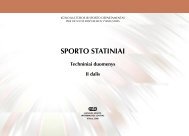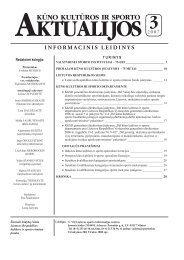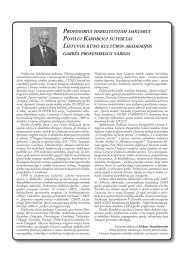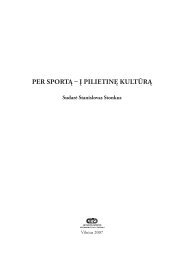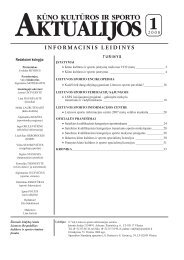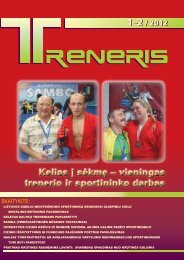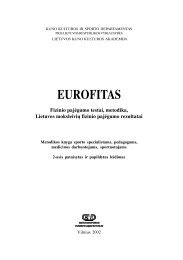Nr. 1 - Lietuvos sporto informacijos centras
Nr. 1 - Lietuvos sporto informacijos centras
Nr. 1 - Lietuvos sporto informacijos centras
Create successful ePaper yourself
Turn your PDF publications into a flip-book with our unique Google optimized e-Paper software.
34<br />
SPORTO MOKSLAS<br />
question the coaches working with children and adults<br />
separately. As the sample size in this study was not<br />
great, dividing the coaches into groups would be<br />
incorrect. Analogically, it is not correct to compare<br />
the attitudes of the coaches with different working<br />
experience towards deception in sports activities. In<br />
the further studies much attention should be paid to<br />
that because research (VonRoenn, Zhang, Bennett,<br />
2004) has shown that people with different work<br />
experience in the field of sport (referees, coaches)<br />
value unsportsmanlike behaviours differently. The<br />
authors established that attitudes of males and<br />
females towards unsportsmanlike behaviour in<br />
sports activities might also be different. Our research<br />
involved only ten women, thus we did not analyze the<br />
data from the standpoint of gender. The further studies<br />
should consider that when planning the sample. It<br />
should be noted that 23 coaches in our research also<br />
worked as physical education teachers. Such practice<br />
in Lithuania is quite common. We suggest that those<br />
coaches who also work as physical education teachers<br />
tend to justify deception in sport much less. This<br />
assumption is based on our reasoning that in school<br />
physical education the aims emphasized should not be<br />
the same as in sports activities, i.e. the aim of school<br />
physical education should be promotion of healthy<br />
life style skills, and not the achievement of maximum<br />
sports results. Thus, our research should be repeated<br />
with different groups of research participants.<br />
References<br />
1. Boardley, I.D., Kavussanu, M. (2007). Development and<br />
validation of the moral disengagement in sport scale. Journal<br />
of Sport & Exercise Psychology, 29, 608-628.<br />
2. Coackley, J.J. (1994). Sport in society: issues and<br />
controversies (5th ed.). St. Louis: Mosby, p. 446.<br />
3. Culbertson, L. (2005). The paradox of bad faith and elite<br />
competitive sport. Journal of the Philosophy of Sport, 32,<br />
65-86.<br />
4. Feezell, R.M. (1988). On the wrongness of cheating and<br />
why cheaters can‘t play the game. Journal of the Philosophy<br />
of Sport, 15, 57-68.<br />
5. Fraleigh, W. (1988). Why the good foul is not good. In:<br />
W. J. Morgan & K.V. Meier (Eds), Philosophic Inquiry in<br />
Sport (pp. 267-270). Champaignm IL: Human Kinetics.<br />
6. Fraleigh, W. (2003). Intentional rules violations – one more<br />
time. Journal of the Philosophy of Sport, 30, 166-176.<br />
7. George, D., Mallery, P. (2003). SPSS for Windows step<br />
by step: A simple guide and reference. 11.0 update (4th ed).<br />
Boston: Allyn & Bacon. p. 231.<br />
8. Guivernau, M., Duda, J. (2002). Moral atmosphere and<br />
athletic aggressive tendencies in young soccer players.<br />
Journal of Moral Education, 32 (1), 67-85.<br />
9. Hsu, L. (1997). Cheating and sports rules. International<br />
Olympic Academy, 7th Postgraduate Session, Greece.<br />
10. Hsu, L. (2005). Revisiting fair play: cheating, the “good<br />
foul” and sports rules. Kinesiologia Slovenica, 11 (1), 43-<br />
49.<br />
11. Kavussanu, M. (2006). Motivational predictors of<br />
prosocial and antisocial behaviour in football. Journal of<br />
Sports Sciences, June, 24 (6), 575‐588.<br />
12. Loland, S. (2005). The varieties of cheating – comments<br />
on ethical analyses in sport. Sport in Society, 8(1): 11‐26.<br />
13. Miller, B.W., Roberts, G.C., Ommundsen, Y. (2004).<br />
Effect of motivational climate on sportspersonship among<br />
competitive youth male and female football players.<br />
Scandinavian Journal of Medicine & Science in Sports, 14,<br />
193-202.<br />
14. Moran, A., Guerin, S., Macintyre, T., McCaffrey, N.<br />
(2004). Why do athletes cheat? An investigation of Irish<br />
athletes understanding of, and attitudes to, cheating behavior<br />
(including doping), in sport, Final Report to Irish Sports<br />
Council (Anti-Doping Programme): 1‐15.<br />
15. Morgan, W.J. (1995). The logical incompatibility thesis and<br />
rules: a reconsideration of formalism as an account of games.<br />
In: Philosophic Inquiry in Sport, W. J. Morgan and K.V. Meier<br />
(2 nd ed.). Champaign, IL: Human Kinetics, 50‐63.<br />
16. Preston, I., Szymanski, S. (2003). Cheating in contests.<br />
Oxford Review of Economic Policy, 19(4), 612‐624.<br />
17. Rosenberg, D. (1995). The concept of cheating in sport.<br />
International Journal of Physical Ecucation, 32 (2), 4‐14.<br />
18. Shields, D.L., Lavoi, N.M., Bredemeier, D.L., Power, F.C.<br />
(2007). Predictors of poor sportspersonship in youth sports:<br />
personal attitudes and social influences. Journal of Sport &<br />
Exercise Psychology, 29 (6), 747‐762.<br />
19. Simon, R. (1999). Internalism and internal values in sport.<br />
Journal of the Philosophy of Sport, 27, 1‐16.<br />
20. Vallerand, R.J., Briere, N.M., Blanchard, C., Provencher, P.<br />
(1997). Development and validation of the multidimensional<br />
sportspersonship orientations scale. Journal of Sports &<br />
Exercise Psychology, 19 (2), 197‐206.<br />
21. Vonroenn, S., Zhang, J., Bennett, G. (2004). Dimensions of<br />
ethical misconduct in contemporary sports and their association<br />
with the backgrounds of stakeholders. International Sports<br />
Journal, Summer, 37‐54.<br />
Trenerių nuostatos į apgaulę sportinėje veikloje<br />
Darbe aptariama apgaulės sporte samprata ir pristatomi<br />
duomenys tyrimo, kuriuo buvo siekta išsiaiškinti<br />
trenerių nuostatas į apgaulės sportinėje veikloje paplitimą<br />
ir jos pateisinimą. Trenerių nuostatoms į apgaulę<br />
Santrauka<br />
Doc. dr. Saulius Šukys, Edas Nickus<br />
<strong>Lietuvos</strong> kūno kultūros akademija<br />
sportinėje veikloje tirti naudotas pačių autorių sukurtas<br />
klausimynas. Jame buvo pateikta 19 teiginių, kurie apėmė<br />
įvairias apgaulės formas: taisyklių pažeidimus, dopingo<br />
vartojimą, išankstinius susitarimus ir kt. Kiekvieną



